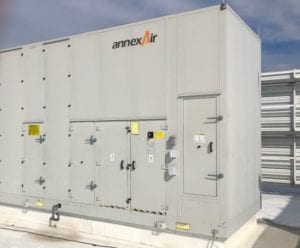Who is a member?
Our members are the local governments of Massachusetts and their elected and appointed leadership.

Ultraviolet tubes installed in 12 air-handling units on the Franklin High School roof help destroy viruses and bacteria in the building. (Photo courtesy Michael D’Angelo/Town of Franklin)
Using technology both visible and hidden, the town of Franklin has improved the air quality in its municipal and school buildings and reduced the chances of people catching COVID-19.
The town in recent months has been installing ultraviolet germicidal irradiation equipment to destroy pathogens — in air handlers, ductwork and wall-mounted units — and placing hundreds of high-efficiency particulate air purifiers in classrooms and other spaces. Franklin is believed to be the first community in Massachusetts to install UVGI technology in school and municipal buildings.
Scientists have known about the germ-killing benefits of ultraviolet technology for decades, but the pandemic has increased its use, said Michael D’Angelo, Franklin’s director of public facilities.
“Everybody I talk to about it, you get the same thing: ‘How come I’ve never heard of this?’” D’Angelo said.
But that’s changing, he added. “It’s becoming mainstream now.”
UVGI technology can kill 99.9% of bacteria and viruses, and institutions including universities and the New York Stock Exchange have already embraced it.
Franklin started by placing ultraviolet lamps in 12, 12-foot-high air handlers on the high school’s roof. As the air handlers draw air from the building, the ultraviolet light breaks down the molecular bonds of pathogens such as the coronavirus, before the rooftop units send the newly cleaned air back inside. The town finished that installation in late January, D’Angelo said.
Unlike the newer high school building, though, other school buildings lacked central air systems linked to rooftop handlers, and required different approaches. In the older buildings, D’Angelo said, the town installed ultraviolet tubes in the ductwork or mounted upper-air units on walls.
Because ultraviolet light can severely damage eyesight, D’Angelo said, Franklin has placed warning labels on the devices, installed automatic-shutoff mechanisms that trigger when people try to open devices, and mounted room units high on walls to prevent people from looking directly into them.
“It was a whole other aspect of this to make sure everybody knew, and everybody was safe,” D’Angelo said.
Besides using ultraviolet light to kill germs, the town also bought 650 larger-size HEPA air purifiers and received another 650 smaller purifiers from the state, D’Angelo said. HEPA units don’t kill the coronavirus, he said, but the high-quality filtration substantially removes other particles, to which the coronavirus can attach. Reducing particles overall is especially important, he said.
Between municipal and school facilities, Franklin has 19 buildings to upgrade. While the high school, municipal offices and other facilities are done, the next big installation phase, taking care of the senior center, the library and three dual-school complexes, will likely finish in early May. After that, a final phase will cover the remaining school and municipal buildings, D’Angelo said.
To pay for the UVGI, Franklin is using $900,000 in CARES Act funds, including $129,000 for the high school installation, D’Angelo said. The HEPA purifiers, at a cost of $429,000, came from a separate CARES Act allocation.
D’Angelo, who is also president of the Massachusetts Facility Administrators’ Association, said many communities are now pursuing ventilation upgrades and UVGI installations, and he expects that forthcoming federal funds will encourage additional projects.
At a Feb. 23 School Committee meeting, Town Administrator Jamie Hellen explained why Franklin has prioritized federal funding for this work, and said this will remain a priority.
“This is an anxious time; we understand that,” Hellen said. “It’s anxious because of COVID, but it’s also anxious after COVID, we believe, in terms of the light that this has shined on public health and viruses and bacteria and air quality, particularly in school buildings.”